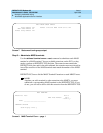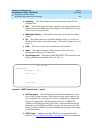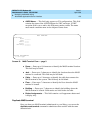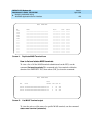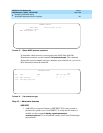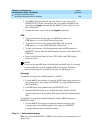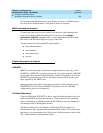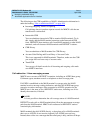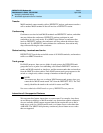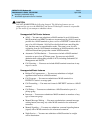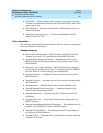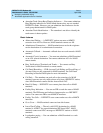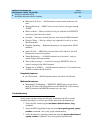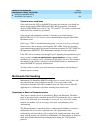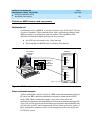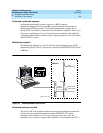
DEFINITY ECS Release 8.2
Administrator’s Guide
555-233-506
Issue 1
April 2000
Managing multimedia calling
225Multimedia Applications Server Interface
9
Transfer
MASI terminals cannot transfer calls to DEFINITY stations, and cannot transfer a
call to another MASI terminal if the call involves a DEFINITY station.
Conferencing
Conferences can involve both MASI terminals and DEFINITY stations, and either
one may initiate the conference. DEFINITY stations participate in such
conferences in voice-only mode. If an MMCX user initiates a conference that
involves DEFINITY stations, the conference will drop when the initiator drops
from the call. If a DEFINITY station initiates the conference, that station may
drop without affecting the other conferees.
Status tracking - terminals and trunks
DEFINITY ECS tracks the active/idle status of all MASI terminals, and monitors
traffic over MMCX interfaces.
Trunk groups
For MASI purposes, there are two kinds of trunk groups: the ISDN-PRI trunk
groups that serve as paths for establishing calls between DEFINITY stations or
trunks and MASI terminals or interfaces, and the remote trunks that are interfaces
from the MMCX to other entities. Each MASI remote trunk group appears to the
switch as a single unit, with no concept of members within the group.
NOTE:
You cannot test, busy out, or release MASI remote trunk groups, since you
cannot dial a MASI remote trunk TAC from the DEFINITY ECS. The TAC
merely identifies the trunk to the switch for status and CDR.
You cannot administer MASI trunks as part of DEFINITY route patterns.
Interactions & Unsupported Features
We can generalize feature interactions to some extent. For example, since there
are no buttons available to a MASI terminal, any feature that requires a button is
also not available. MASI cannot support features that require the user to dial a
trunk access code for a MASI remote trunk, or a feature access code other than
AAR/ARS. The MMCX dial plan may contain only those feature access codes
that are supported.



